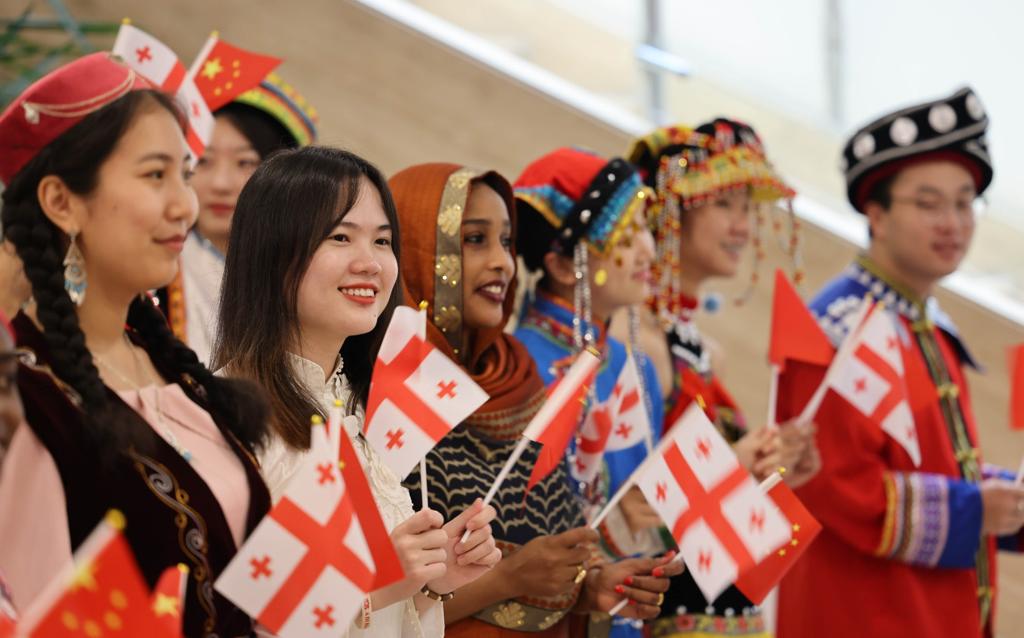Push Westward: China on the Black Sea
China on the Black Sea
As the world is distracted by the war in Ukraine, a new agreement between Tbilisi and Beijing could pave the way for Chinese presence in the Black Sea.
In July China and Georgia signed a strategic partnership agreement, which aims at elevating bilateral collaboration in trade, infrastructure, political relations, and education.Georgia pledged to enhance cooperation in regional and international affairs with China, as well as support China’s two influential projects: the Belt and Road and Global Security initiatives.
China’s economic importance to Georgia has been minimal, even despite the free trade agreement signed in 2017. Though Georgia has historically received the majority of Chinese investment in the South Caucasus, in 2022 those totaled only 109 million dollars in 2022 out of total $2 billion of total FDI into Georgia. Notable Chinese investments are the $195 million Hualing Tbilisi Sea New City special economic zone in the north of Tbilisi, Khadori Hydropower Plant and the Nenskra hydropower facility built by $100 million in funding from the Asian Infrastructure Investment Bank (AIIB).
Another critical infrastructure project is the $114 million project funded by AIIB in 2017 to build a bypass road surrounding Georgia’s coastal city of Batumi. China Railway 23rd Bureau Group (China Railway) also stated in 2019 that it will construct the new 22.7 km Kvesheti-Kobi route in Georgia. The project’s overall cost is anticipated to be $428.6 million. Some promised investments have not materialized, such as the Kutaisi electric car factory.
Despite the centrality of Georgia to China’s overall approach to the South Caucasus, the region has never been that critical to China. Trade has been growing since the 1990s, and from 2001 to 2020 it increased from $25 million to $3.7 billion. Yet China’s imports from the South Caucasus have been dominated by raw materials (ores and oil). Meanwhile, the idea of a “Middle Corridor” between Asia and Europe was attractive on the map, but in practice it remained a cumbersome route, especially compared to the easier path throughRussian.

The signing of the strategic partnership marks a real change in China’s thinking, which needs to be explained from a wider geopolitical context. From the Chinese perspective major shifts are taking place in the wider Black Sea region, where Russia and the West are competing to build exclusive geopolitical orders. Western powers and Russia are distracted by the war in Ukraine, creating a vacuum in the eastern Black Sea and the South Caucasus. Turkey and Iran have grasped this opportunity and China seems to be doing the same.
For China it is also about Georgia’s geographic position as a Black Sea actor and the emerging Middle Corridor hub. The Anaklia deep seaport is a major project that Beijing might be aiming to be a part of, upgrading Georgia’s poor railway infrastructure could be another.
Then comes the Middle Corridor stretching from the Black Sea to Central Asia. Beijing was initially hesitant to support the project, but earlier this year the Chinese ambassador to Georgia publicly backed the idea. The new strategic partnership explicitly mentions the need to develop the Middle Corridor. What happens in Central Asia also supports this trend. Beijing is upending traditional connectivity patterns by developing east-west roads and railways turning Central Asia into the first step towards establishing land connections to the EU which would bypass Russia. Tentative progress on the long-stalled China-Kyrgyzstan-Uzbekistan railway highlights this trans-regional process.
Yet it is not only about China and its strategic interests. Tbilisi was also interested in advancing the ties at this exact moment. Georgia’s foreign policy is undergoing substantial changes. The country’s goal surely remains to get closer to the EU, but there are concrete signs that Tbilisi is building a multi-vector foreign policy. Closer ties with China fit into this emerging pattern.
The new Strategic Partnership with China coincides with the EU’s refusal to grant Georgia candidate status. Tbilisi might be indirectly implying that rejection could drive the country towards other power centers. Essentially, Georgia is trying to put itself on geopolitical auction to see who would be willing to pay more. China has cash and that makes it a potentially powerful player in the struggle for the South Caucasus land bridge.
The internal Georgian political situation matters too. Reactions to the partnership were mixed. Those who support the ruling party welcomed the decision. The political opposition strongly resisted the argument that the move would isolate Georgia from the collective West. Both views seem overly radical. It is unlikely that China will be that quick to move into the South Caucasus.
Nor will the EU pressure Tbilisi because of the deal (at least for the moment), because much is still unclear about the signed partnership. Tbilisi still remains the major partner to the West in the region and it will be unwilling to risk those relations. Much depends on how Georgia is performing by the end of 2023, when the EU will be making a final decision on EU candidate status. Refusal could push the country further away from the West and a viable alternative could be China.
Overall for China, economic benefits emanating from Georgia have always been minimal and this is likely to continue. The crucial question for Beijing is whether the geopolitical dividends from engaging with Georgia and the South Caucasus would outmatch meager economic benefits. For the moment there is little evidence of that. The signed strategic partnership, though a significant development in itself, still needs to be backed up by concrete Chinese investments.

Emil Avdaliani is a professor at European University and the Director of Middle East Studies at the Georgian think-tank, Geocase


















